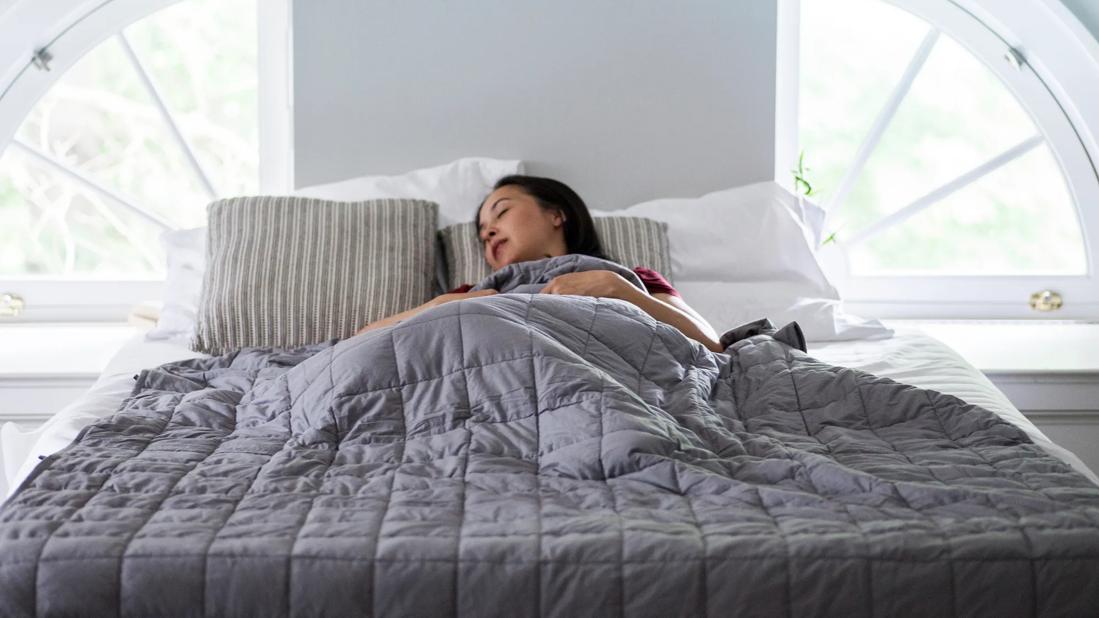Limited research suggests a weighted blanket may help with anxiety, insomnia and other conditions

Search online and you’ll find dozens of weighted blankets for sale. But studies of their effectiveness are harder to come by.
Advertisement
Cleveland Clinic is a non-profit academic medical center. Advertising on our site helps support our mission. We do not endorse non-Cleveland Clinic products or services. Policy
Do weighted blankets help you fall asleep and stay that way? Maybe. Maybe not.
We talked with sleep medicine psychologist Alicia Roth, PhD, about the potential benefits.
Weighted blankets are filled with plastic pellets or glass beads that make them heavy — imagine the lead vest you wear during dental X-rays, on a bed-sized scale. They range from about 5 to 35 pounds, and devotees say they can ease anxiety and help you get a good night’s sleep.
The reason weighted blankets may work is based on the calming effect of deep pressure stimulation. Things like a tight hug or swaddling a baby are examples of deep pressure stimulation. And weighted blankets may have similar comforting effects.
Dr. Roth points out that health professionals like occupational therapists use deep pressure touch to help calm children with autism spectrum disorder (ASD).
But do those methods translate directly into a benefit for sleeping under a weighted blanket?
Possibly. But the science as it stands isn’t solid enough to draw surefire conclusions.
“The current studies on weighted blankets are small and have some limitations,” Dr. Roth acknowledges. “So, we can’t definitively say that weighted blankets make a big difference.”
Advertisement
On the other hand, there isn’t any evidence against weighted blankets either. And plenty of people swear by them. “Anecdotally, people do say they’re helpful,” she adds.
What are the potential benefits of weighted blankets? Dr. Roth shares some insight.
Though more research is needed, some studies have associated using a weighted blanket with reduced anxiety.
“Some people go to bed prepared to do battle,” Dr. Roth illustrates. “The moment they switch off the light, their brain switches on.”
If that sounds like you, a weighted blanket may help. But it shouldn’t be your frontline solution for dealing with nighttime anxiety.
Weighted blankets are often marketed as a solution to insomnia. So, if you regularly struggle to sleep, you may be tempted to try it.
The research there is sparse. But one study looked at 120 adults with clinical insomnia and at least one other neurological and mental health condition (like depression or ADHD). The researchers found that people using weighted blankets reported improvements in their sleep.
Another study of 102 adults with insomnia showed that those who used a weighted blanket had significant improvements in their sleep quality.
It’s a promising start. But more research is needed to confirm the results.
As weighted blankets are based on deep pressure touch, which is a common strategy for managing autism, it stands to reason that weighted blankets would be a benefit for autistic people.
But research on that hasn’t been definitive.
In 2020, the American Academy of Neurology published guidelines for addressing sleep problems in children and teens with autism. They stated, in part, that they found “no evidence that routine use of weighted blankets or specialized mattress technologies improve sleep.” The authors went on to say that weighted blankets also haven’t been reported to be dangerous and that they may be a reasonable strategy for helping autistic kids sleep better.
In other words, they might help, or they might not. But they could be worth a try.
Researchers are also testing weighted blankets as a tool for managing stress and anxiety in clinical settings.
One study suggests weighted blankets may be an alternative to using physical restraints for children during dental procedures. Other research shows that using weighted blankets can be comforting to people who are undergoing cancer infusion treatments.
Weighted blankets come at all different price points, ranging from the neighborhood of $30 to several hundred. If you’re willing to shell out for one, it’s possible it could help. Look for one that’s no more than 10% of your body weight to keep it from being too heavy.
Advertisement
But don’t expect miracles. Good sleep habits still matter, like:
Sleep is important for your physical and mental well-being. So, if it isn’t coming to you naturally, it’s worth getting to the bottom of it. But don’t expect a weighted blanket to be the cure. Talk with a healthcare provider about other ways to address sleep disturbances and get the rest you need.
Advertisement

Sign up for our Health Essentials emails for expert guidance on nutrition, fitness, sleep, skin care and more.
Learn more about our editorial process.
Advertisement

To avoid sleep deprivation and shift work sleep disorder, try adopting habits that minimize light exposure and prioritize daytime sleep

Sleep disorders, mental health conditions and other health concerns can all affect the quality of your sleep

Most people fall asleep within 10 to 20 minutes, but if your experience is different, adjusting your sleep schedule may help

Stick to a consistent schedule, be mindful of screen time and work on reducing your stress levels before bed

Napping can boost focus, memory and mood — if you time it right
These devices can help shed light on what’s happening with your body during rest

Keep a dream journal, set your intentions before bed and make sure you’re getting a full night of high-quality sleep

Controlling your dreams may help you tap into your creativity and even reduce anxiety

Even small moments of time outdoors can help reduce stress, boost mood and restore a sense of calm

A correct prescription helps your eyes see clearly — but as natural changes occur, you may need stronger or different eyeglasses

Both are medical emergencies, but they are very distinct events with different causes